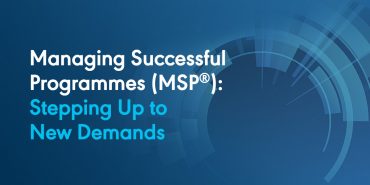Tapping into the power of data to drive capability uplift results

Running an effective capability uplift program means leveraging the power of data and analytics to inform your decisions and promote ongoing, measurable improvements. Here Nekta Vamvoukakis, PM-Partners Corporate Training & Capability Uplift Manager, discusses how to use data to drive capability uplift results.
Getting your L&D strategy right isn’t just about broadening your team’s skill set – it’s about investing in a mix of approaches to uplift capabilities over the long term and drive a culture of continuous improvement. And an organisation that exudes such a culture is more likely to attract and retain the best talent, which is especially critical in today’s tight labour market. In fact, according to a LinkedIn Workplace Learning Report, a whopping 94 per cent of employees say they “would stay at a company longer if it invested in their learning and development”.
These days organisations have a variety of techniques to choose from to both improve skills and embed learning – from flexible training to hands-on coaching, refresher courses and micro-learning. But how do you know which approaches are most suitable for your team/s, and whether they’re working? “Lack of time” is by far the biggest L&D obstacle for almost two in three organisations (61 per cent), and budget constraints come next, so you want to get things as close to right as possible from the outset, and have the ability to make smart decisions along the way.
The answer lies in data – which means assessing and tracking how you’re faring at regular intervals and using the results to refine and prove your approach. Here we consider the role of data to drive capability uplift results and what to focus on to maximise your L&D outcomes and ROI.
Using data to drive capability uplift results
Unlike one-off training investments, a successful capability uplift program leverages data and measurement tools to:
- understand pain points and opportunities for improvement
- highlight potential challenges and/or resistance to learning and embedding
- measure the results of your chosen strategies.
This approach empowers organisations to address capability gaps with a tailored package of uplift techniques. Then, by tracking how teams respond to specific solutions, you can demonstrate the improvements being made and/or identify where there may be teething issues. These insights can help you restructure your strategy to best align with your organisation’s long-term priorities and drive a targeted roadmap of performance improvement. This is doubly important when you consider that only 40 per cent of companies believe their learning strategy is aligned to their business goals.
Measuring your uplift efforts in this way makes the whole learning approach more accurate and results driven. Results, it’s important to note, can be both tangible – in terms of ROI from better delivered initiatives – as well as intangible, as employees see the investment and commitment being made in their future with the organisation.
Data types to leverage – and how to capture them
While training is inherently about teaching someone new skills, capability uplift is about empowering your team to actively perform better thanks to ongoing training and coaching. This means improvement is not tracked through knowledge (e.g. do I know the theory), but how that knowledge is put into practice in the workplace on a day-to-day basis and the results this application achieves. To this end, valuable metrics to measure include employee and project performance, how teams apply new skills, process recall, and more.
Critically, these can be measured at both the pre-rollout and post-rollout phases of your L&D strategy. Pre-rollout you’ll be able to assess and analyse how your people learn, blockers to success and what they need to develop – such as to close skills gaps, improve employee knowledge and processes. Post-rollout is all about assessing how new teaching is being applied to day-to-day roles and making data-informed decisions to avoid your organisation wasting time on ineffective L&D programs.
To capture this data, you can:
- Analyse performance metrics (e.g. cost performance/efficiency) of your existing projects, Agile rollout, or your entire PMO. This also helps to identify the why of your capability uplift program and a quantifiable ROI. Tracking results data then enables you to measure performance improvements.
- Conduct capability assessments. This can be streamlined through dedicated platforms such as PM-Partner’s Capability Hub. It’s a free-to-use tool that uses behavioural data and analysis to help you measure the impact of training and skills uplift, with the goal of driving improvements in your team’s capabilities.
- Carry out regular health checks and post-implementation reviews (PIRs) – analysing review data helps to assess current state pre-roll out and ensures that knowledge/ best practice is being put into place as findings are fed back into the capability uplift program to drive improvement.
Every organisation is different but in terms of how often to measure, it should be an ongoing task. Ultimately it will depend on what type of training and coaching you roll out, but it’s a good idea to measure more frequently in the early stages to ensure your strategy is aligned to your business goals and is delivering ROI.
How to transition to a data-driven capability uplift approach
From senior executives and department heads, through to L&D and HR managers, the benefits of having a more capable and skilful team are numerous. But in terms of the actual program rollout, it’s important to do your due diligence (i.e. find the most appropriate service provider for your needs) and start small.
Ongoing investment in capability uplift versus one off training events requires a mind shift and a budgeting shift, so a measured transition may be more realistic until you have broader buy-in, especially for busy organisations where PMs are juggling multiple projects at once.
As a case in point, PM-Partners recently took a pilot approach with one of our clients starting with just one Agile team. Once the core skills training was completed, we engaged in a quarterly cycle of health assessments, team coaching and refresher training to embed skills and promote repeatable behaviours. At the end of each cycle, refinements were made and an improvement roadmap was created for the team to follow. Combined with the assessment data, we could show and measure improvements and – as a result – the organisation has rolled out this approach across other teams, which is enabling them to prioritise their backlog and move to MVP more effectively.
Embedding new learning techniques and achieving greater capability uplift across your team should be an ongoing goal for organisations. So, make sure you are collecting L&D data, analysing your team’s results and using those insights to inform how your training and coaching should be carried out over the long-term.
PM-Partners can help you harness the power of data to drive and optimise critical delivery capabilities across your organisation. Contact us or call 1300 70 13 14 to find out more.

About The Author
Nekta Vamvoukakis
Corporate Training & Capability Uplift Manager, PM-Partners
After nearly a decade with PM-Partners, Nekta has worked with organisations from all major sectors including state and federal government, banking, utilities and construction, to help create and drive their capability uplift programs. Familiar with all the latest in global best practice standards and certifications and the full spectrum of frameworks and methodologies, he can assist with building tailored learning and ongoing performance improvement pathways for project, product, programme and portfolio managers, change managers and business analysts. Nekta strives to adapt capability programs to his clients’ exact needs and desired outcomes, including supporting their journey from simple upskilling to a complete organisational transformation skill set.







